Home >
News & Events >
Of Interest >
A celebration of the Sun Yat-sen University International Writers’ Residency
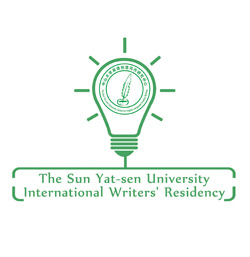 A celebration of the Sun Yat-sen University International Writers’ Residency
A celebration of the Sun Yat-sen University International Writers’ ResidencyThe first Sun Yat-sen University International Writers'
Residency ran from October 18 to November 14, 2015.
It is the first of its kind in China, through which 15
writers/translators from 10 countries met and wrote.
Written by: Dai Fan, Philip Graham, Austin Woerner, Nazli İnal, Zheng Yanfang
Photo by: Wei Donghua, Austin Woerner, Dai Fan
Proofread by: Peng Dongmin
Edited by: Wang Dongmei
Organized by The Sun Yat-sen University Center for English-language Creative Writing, and sponsored by Lingnan Foundation and Tourism Administration of Jiangmen Municipality, the first Sun Yat-sen University International Writers' Residency ran from Oct. 18 to Nov. 14, 2015. It is the first of its kind in China, through which 15 writers/translators from 10 countries met and wrote in Yangshuo, Guangxi Zhuang Autonomous Region and in Jiangmen, Guangdong Province. The Residency strove to promote the reading, discussion, and writing of world literature by providing a space for international writers to read and write; by giving international writers a chance to engage with Chinese literature and literary translators, Chinese culture and people; by creating opportunities for students to interact with internationally renowned writers; and by showcasing the creative writing of Sun Yat-sen University's faculty and students.
Altogether, 14 events were held. Among them, three were reading, respectively held in West Street, Yangshuo on Oct. 26, 2015, on the Guangzhou campus of Sun Yat-sen University on Nov. 5, at Wuyi University in Jiangmen on Nov. 6. Three panels were held in discussing the teaching of creative writing, the craft of writing, and various aspects of literature in the global context. A total of 5 lectures/seminars were held on the Zhuhai and Guangzhou campuses of Sun Yat-sen University. A workshop and a poetry seminar were organized for students and faculty members of the Department of English. Furthermore, a lecture on contemporary literature was arranged for the international writers.
The cultural events included the mountain song fair in Yangshuo on Oct. 26, and Shamian and Shangxiajiu district in Guangzhou, as well as the Diaolou visit on Nov. 7 in Kaiping, Guangdong province. The visit to Xinhua College on Nov. 4 saw one of the highlights during the Residency, when writers began reading their poems at dinner.
Unlike residencies that are usually meant for writers to write in other parts of the world, the Sun Yat-sen University International Writers' Residency have three major characteristics: one is the presence of students, who benefited from the Residency through attending lectures, through taking writers around, and through interacting closely with writers in Yangshuo and Jiangmen. Another characteristic is that all writers participated in teaching either in the form of a lecture, or in a panel discussion, or a seminar, or a workshop, and came to know more about students through reading their creative work, and through their performances that were part of the reading events at Sun Yat-sen University and Wuyi University. Still another characteristic is the cultural visits in Yangshuo, Guangzhou and Jiangmen, through which writers were given first-hand cultural experiences.
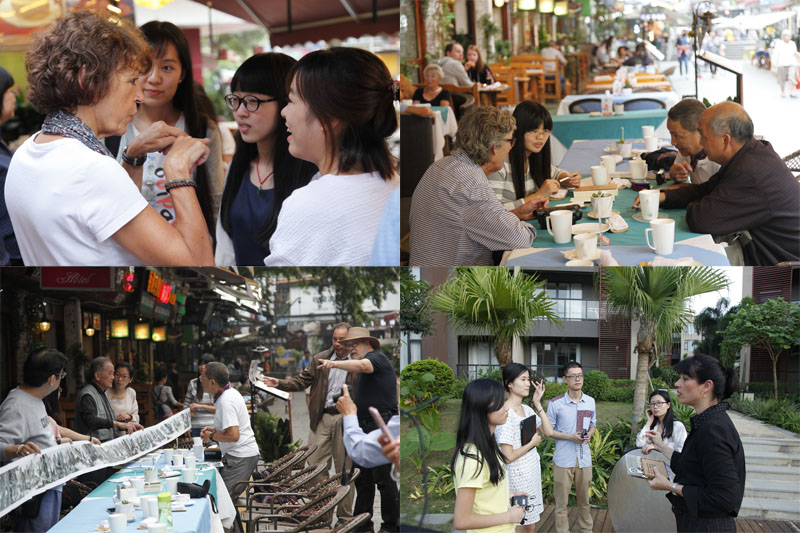
Writers and Students at the Residency
Yangshuo: Mountain Song and Reading
The first week of the first Sun Yat-sen University International Writers’ Residency was capped by a day of delightful cultural exchange in the town of Yangshuo on Oct. 26, 2015.
The day began when the writers traveled to Yangshuo’s main park and observed a competition of Mountain Song Singers. Four small groups of beautifully dressed singers challenged each other with improvised lyrics that they added to traditional melodies.
Professor and writer Dai Fan translated the often teasingly playful lyrics for the benefit of the writers, and by the end of the competition some writers dared to share their own songs.
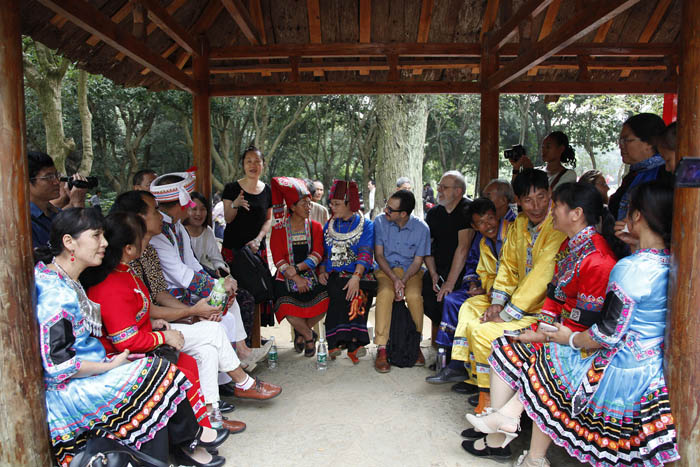
Prof. Dai Fan translating mountain song lyrics for writers
After the competition, the writers and two of the mountain song singers, one of whom is known as the ‘Queen of the Mountain Singers’, feasted at the Cloud 9 Restaurant. The two accomplished singers continued their performance throughout the meal, and while doing so they also recorded and texted their latest lyrics to other Mountain Song Singers, who responded via phone with their own lyrics!
After lunch, four of the residency writers presented a public reading of their writing in the open courtyard of the Beer Fish Restaurant on West Street.
The Belgian nonfiction writer Lieve Joris read from a moving account of her travels in the isolated mountain region of the far eastern Congo, followed by Jeanine Leane, fiction writer and poet, who read an autobiographical story of an aboriginal child’s difficulties fitting in with the other children in a white Australian school, while also taking in the worldly advice of her ‘aunties’ at home. Fiction writer, poet and travel writer Catherine Cole then read a short story about a young Australian teacher’s attempt to teach her land-bound students something about the distant, never-seen sea. The translator and fiction writer Roberto Frías concluded the event with a section from his novel-in-progress, Inventory, which is structured around the narrator’s unusual, extended answers to the Minnesota Multiphasic Personality Inventory.
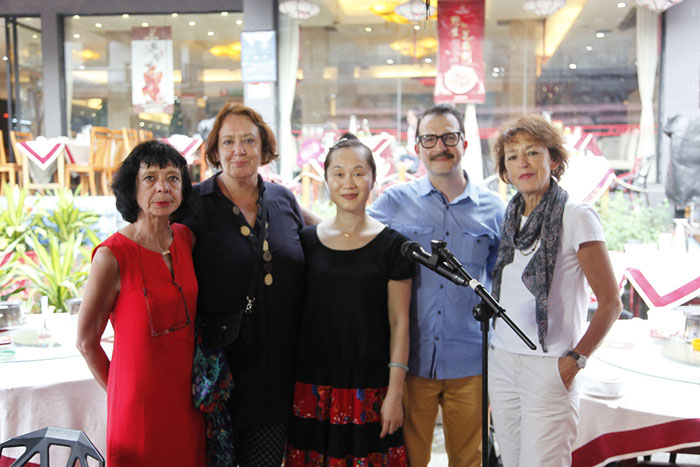
Jeanine Leane, Catherine Cole, Dai Fan, Roberto Frías, and Lieve Joris (left to right)
Immediately following the reading, three local artists in the audience then gave an impressive display of their own artistic abilities. Zhang Changlian wrote out, in elegant calligraphy, a poem by Wang Wei, followed by Qin Guilan who wrote in bold broad strokes a four character poem as her emotional response to the public reading. And Wu Fangkui demonstrated his skills by painting a floral design on a fan. Everyone in the audience stood nearby, entranced as these artists produced—seemingly effortlessly—such impressive work.
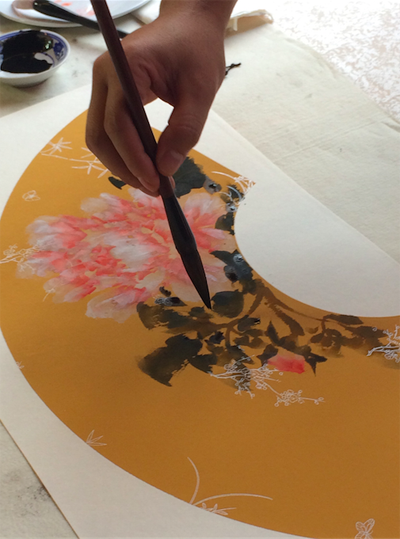
Chinese calligraphy and painting by local artists
By the end of the day, all the writers of the International Writers’ Residency, who had come to Yangshuo to write in a beautiful setting of mountains and rivers, had also learned much about Chinese artists and culture.
Guangzhou and Zhuhai: Public and Cultural Events
On Tuesday Nov. 3, 2015, the Sun Yat-sen University International Writers’ Residency kicked off its slate of Guangzhou events with two panel talks on world literature and writing pedagogy, culminating in a stunning performance of Kathakali dance by Indian actor and playwright Arjun Raina.
In the morning, Filipino writer Ricardo de Ungria and Australian Aboriginal writer Jeanine Leane joined Professor Guo Bingru of the SYSU Chinese Department for a talk entitled “Development of Literary Themes in China, the Philippines, and Australia.” Each writer gave a brief overview of the contemporary literature of his or her nation, beginning with Leane, who is a poet and scholar of the Wiradjuri nation of southeast Australia. “An Aboriginal writer doesn’t act as an individual,” Leane explained; rather, he or she consults every person upon whom the story touches. Thus her novel Purple Threads, though only 157 pages, took six years to write.
Ricardo de Ungria, a poet who currently teaches creative writing at UP Mindanao in Davao City, Philippines, discussed the complicated choices a Filipino writer must make when it comes to language. Whether one writes in English, Filipino, Tagalog, or Spanish is influenced by, and has ramifications upon, a host of political and economic factors. Professor Guo then surveyed Chinese literature of the past 50 years, focusing on the role of love, as manifested by readers’ differing perceptions of the protagonists of the novel My Wife and I before and after 1978.
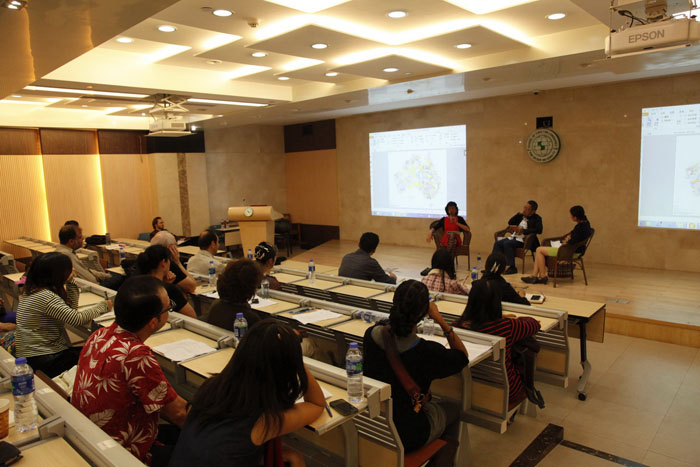
Jeanine Leane, Ricardo de Ungria and Guo Bingru(left to right)
In an afternoon talk entitled “Creative Writing: Pedagogies and Opportunities,” authors Patricia Foster from the University of Iowa, Philip Langeskov from the University of East Anglia, and Dai Fan of Sun Yat-sen University reflected on their own experiences teaching creative writing in highly different environments. Patricia Foster took a personal angle, describing how she encourages her graduate writing students to explore “ruthless intimacies”; Philip Langeskov outlined how he teaches introductory courses for undergraduates; and Dai Fan elaborated on the innovations she has made in adapting creative writing pedagogy to Chinese classrooms, such as making students synthesize contradictory feedback from different instructors, and encouraging them to challenge conventions by staging “creative happenings” around campus.

Dai Fan (left) and Philip Langeskov (right)
Finally, in what was quite literally a dazzling finale, actor Arjun Raina appeared in full Kathakali regalia, complete with glittering golden breastplate, colorful stage make-up and massive golden headdress, to perform a Shakespeare-inspired dance piece called “The Magic Hour.” Stomping, bellowing, and rendering the Bard’s immortal lines in the stylized hand gestures of Kathakali dance, Raina cast a spell over the audience worthy of the performance’s name. Raina, who is India’s leading voice and speech coach and trained in England as a Shakespearean actor, told of his quest to find his own “voice”: taking a foreign language, English, which was imposed on him as a child, yet is nevertheless a significant part of his identity, and “bending it to [his] will,” making it his own. The story seemed a potent metaphor for the challenges facing all non-English-speaking writers in today’s globalized world.
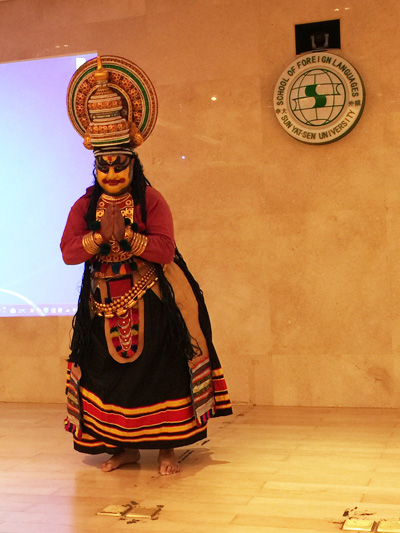
Arjun Raina performing Kathakali dance
Nov. 4th, 2015 saw the second panel meeting of the Sun Yat-sen University International Writers Residency Program on the theme of World Literature in Lecture Hall 101, School of Foreign Language, Sun Yat-sen University, China. The panel discussion featured Ke Qianting, Madeleine Thien, and Lieve Joris, who brought forth insightful, inspiring perspectives on the study of and the practice of transnational writings. The energy and excitement around the panel discussion impressed both the lecturers and audience.
Prof. Ke Qianting from the Chinese Language Department of Sun Yat-sen University discussed the writing practice of Michael Ondaatje, a Canada-based novelist. She highlighted the reoccurring theme of homelessness and rootlessness in Ondaatje’s novels and the influence of travel and migration on the construction of a diasporic identity. She pointed out that cultural exchange and merging is the power great enough to deconstruct the myth of cultural origin, and weaken cultural nationalists’ blind pursuit of authenticity of race and clanship.
Madeleine Thien, Canada-based award-winning short story writer and novelist, shared her writing experience, including the initiation of the idea, her researching and the obstacles she had in completing her latest novel on the theme of Cambodia, Dogs at the Perimeter. Thien emphasized the complexity of the unresolved history of Cambodian genocide, and the transformation or reinvention of the self of a person when one has to put part of his or her life away in order to live freely.
Lieve Joris, a Holland / Belgian non-fiction writer on the Middle East and Africa, brought to the floor her writing experience in Congo and China. In her successive Congo-based non-fiction writings, and in her latest book, On the Wings of the Dragon, an attempt of probing into the relationship between Africa and China, Joris explored transnational themes including post-colonialism, gender, and identity politics. While describing the disintegrating national unity in the colonialism-tainted Congo, and submerging herself in the life of Africans who cling to the wings of economy of China, Joris looked for both local and global themes of love, friendship and compassion.
The panel discussion lasts from 10:45 to 11:45, followed by a heated discussion between lecturers and the floor. Attendants of the International Writers Residency program and researches and students from Sun Yat-sen University raised questions about and shared their own experiences of transnational reading and writing practices. The discussion closed at 12: 45.

Madeleine Thien, Lieve Joris and Ke Qianting (left to right)
On the same morning, five authors from the first Sun Yat-sen University International Writers’ Residency gave freshmen and sophomores on the Zhuhai campus a stimulating introduction to the writer’s craft. “Daydreaming has helped me become myself,” writer Philip Graham told assembled freshman English majors, and the freshmen listened with rapt attention as Graham, who has published two short story collections, a novel, and several memoirs, described the skills that lie at the heart of fiction writing: daydreaming, lying, editing memories, and exploring the “hidden continents” within ourselves and others.
For English majors at Sun Yat-sen University, who are required to study creative writing in their sophomore year and have the option of writing a creative thesis, Graham’s lecture, which comprised the first half of a talk called “Introducing Creative Writing,” was an exciting glimpse of what lies ahead. Graham stressed that creating narratives and inventing fictional personalities is a basic human reflex, a skill we all possess. Quoting writer Janet Burroway, he said, “The moments that altered your life you remember at length and in detail: your memory tells your story, and it is a great natural storyteller.”
For the second half of the talk, New Zealand playwright and poet Lynda Chanwai Earle stepped in to discuss her own work, giving students a concrete example of how the themes of Graham’s talk are put into practice. Earle, who is Cantonese descent, described the genesis of two of her plays that grapple with her ethnic background, including Ka-Shue, the first major theatrical production by a New Zealand Chinese.

Lynda Chanwai Earle (left) and Philip Graham (right)
Meanwhile, British short story writer Philip Langeskov and Egyptian novelist Khaled Khamissi recounted the lessons of their careers in writing to sophomore English majors in a talk called “The Craft of Writing.” The sophomores, who are currently taking Professor Dai Fan’s introductory creative writing workshop, listened as Langeskov plumbed “the mysterious art of the short story,” the form the students are now practicing in class. “A short story makes the reader ask a question,” explained Langeskov, who teaches fiction writing at the University of East Anglia. And the short story writer has three jobs to do: “Make the story memorable, make it continue, and create a life in the reader’s imagination.”
Afterward, Khamissi, whose work struggles with social problems in contemporary Egypt and who is also a prominent cultural activist, took a step back and recounted his own education as a writer. When he was young, Khamissi was schooled by his grandfather, who gave him a massive list of classic literature that he was to master over the next twelve years. Being a lifelong reader is crucial for gaining command of literary forms, Khamissi stressed. So is being a lifelong “receiver”—practicing the skills of observation and research that are central to the writer’s art.
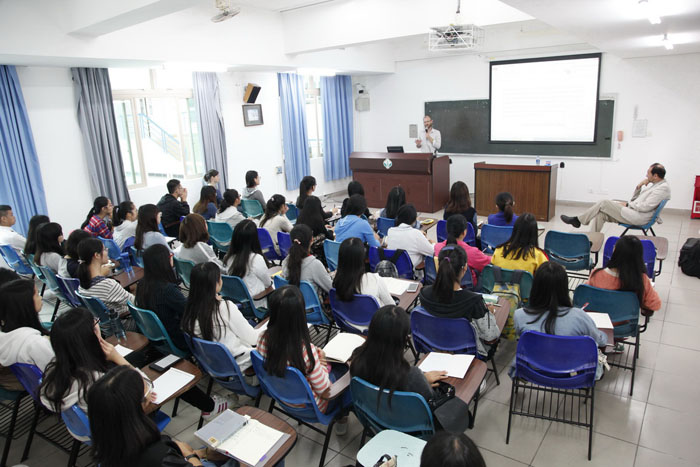
Philip Langeskov (left) and Khaled Khamissi (right)
The same morning, Mexican author and translator Roberto Frías presented a talk to the students and faculty of Spanish major at School of International Studies entitled “A Panoramic Overview of Contemporary Ibero-American Literature.” For some Chinese students, Latin-American literature is no more than Grarcia Marquez and Pablo Neruda. Mr. Frías’ talk provided a holistic picture of Latin-American literature to the students and introduced the literary trends since 1900s in Mexico, Chile, Peru, Columbia and other Latin American countries. “Mr. Frías’ talk is very informative and timely,” according to Zhang Zhongli, the director of Spanish Department, “For a long time, we are too obsessed with writers from Spain but neglect the fact that Latin America produces more outstanding writers than Spain.”

Roberto Frías
Guangzhou: Opening Ceremony
The Sun Yat-sen University International Writers’ Residency was ready to hold its opening ceremony having brought together more than twenty prominent literary figures from all around the world on Thursday, November 5, 2015. Austin Woerner and Nazli İnal from the Department of English and the Center, hosted the event.
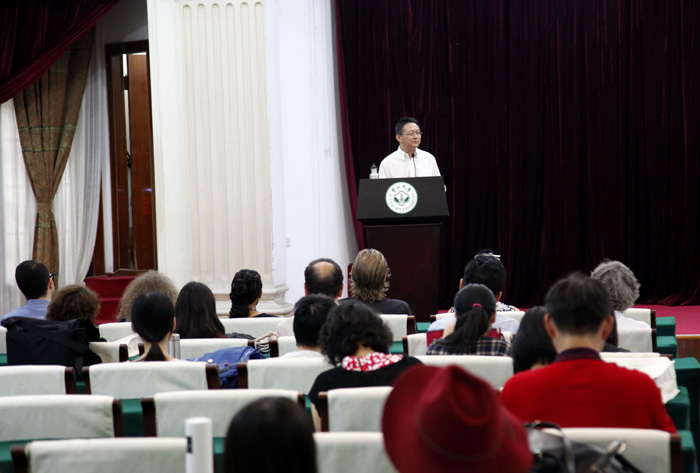
Prof. Chang Chenguang giving an opening speech
In the Swasey Hall the ceremony started with brief opening remarks from Professor Chang Chenguang, the Vice Dean of the Faculty of Foreign Languages and International Studies. Professor Dai Fan, the head of the Department of English and director of The Sun Yat-sen University Center for English-language Creative Writing, whose brainchild the residency is, spoke next, and told the story of her project, which went from a mere idea to a very successful international writers’ residency in less than a year, of which people talked about often using phrases such as, “unlike any other” and “too good to be true.” Professor Dai reminded the audience of the Chinese proverb, “有钱出钱,有力出力(if you have the money, put in the money, if you have talent, put in the talent) and meticulously thanked all of the patrons, participants, as well as the administrative and student helpers before she left the stage to the writers and the translators, who had a couple minutes to introduce themselves, and took the opportunity to show their gratitude. Many of the writers especially commended the Sun Yat-sen University students both on their assistance during the residency and their perceptiveness in matters of life and literature.
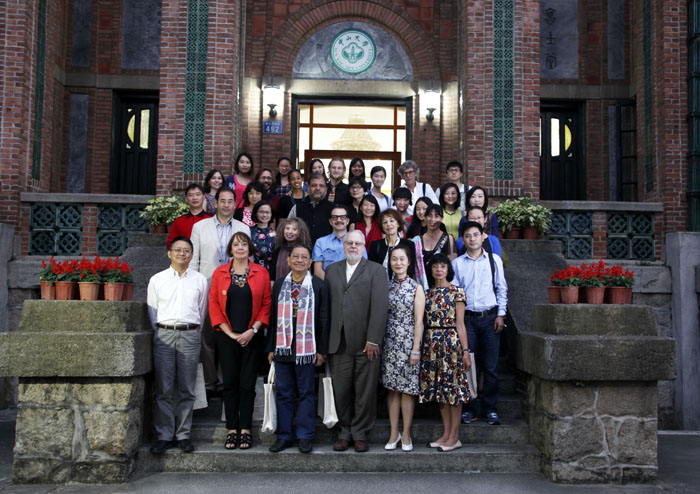
A group photo in front of Swasey Hall
Later that night, Eileen Pun, Philip Graham, Khaled Khamissi, and Professor Dai Fan gave a reading as a part of the final event of the residency at the Guangzhou Campus. Each one of the writers have picked daring and emotional pieces, as if to show us that the task of writing required more than the initial urge of telling one’s story, that it asked of the writer to look into exactly what she would have preferred to dismiss or forget, to replace blame with an honest inclusion and a relentless and profound examining of the events and people, and also at times, although not explicitly, to serve as a reviewer of social norms or political decisions.
The reading was followed by The Banquet, a short film that borrows its name and concept from Feng Xiaogang’s 2006 adaption of Hamlet. Four English majors have shot their own version of the film when they were studying abroad in Germany and wanted to show their European classmates a Chinese interpretation of Shakespeare’s famous play, and they presented it to the audience of international writers with a prologue discussing the uses of masks in theater.
The surprise of the evening was Zhang Jimo’s eight-year-old son Zhang Tianyi, whose elegance—he wore a red bow-tie—and confidence, immediately endeared him to the audience. He read a story about dinosaurs, which was the first chapter of “the book [he was] currently working on.” The evening closed after a number of environmentally and morally conscientious skits by the Big Tree Characters.
Jiangmen: Reading
On Friday, November 6, 2015, the residency traveled about an hour and half south of Sun Yat-sen University, and after a lunch that did not exclude a black, cicada soup, among other regional delicacies, arrived at the Wuyi University in Jiangmen. Ricardo de Ungria, Lynda Chanwai-Earle, Patricia Foster, and Madeleine Thien gave a reading to an audience of a hundred or more students and faculty that had gathered in the Alumni Room. The event was hosted by Austin Woerner, who is a Chinese-English translator himself, and is teaching English and Creative Writing at Sun Yat-sen University in the 2015-2016 academic year.

Reading at Wuyi University in Jiangmen
Ricardo de Ungria was the first one to read, and he dedicated his reading to the “cicada or whatever song that has remained from him,” with whom he said he had “a close encounter with” at lunchtime. De Ungria performed his poems in a most subtle and delicious manner, and also indulged the audience with a first—he had never read any work that was not published, but he wanted to read a few character and landscape sketches that the residency inspired, texts that he had written in Yangshou.
Lynda Chanwai-Earle apologized for her use of strong words, and read a long poem that dealt with race and coming-of-age in the most personal terms, reciting entire sections, letting her audience bask in not only her words, but rather her song, the feeling that is woven into the song, the unsayable that the words hide but the poem inevitably conveys.
Patricia Foster followed Chanwai-Earle with an essay titled “Skin,” about teaching writing in the United States, in the south, where she was told, “You are so white,” which was at once a statement about her skin color, a not so indiscreet refusal to work with her, and also a question asked with a childlike fascination: What are you doing here? As she had warned her audience that she would, Foster did fall into a thicker southern accent, which entranced her listeners, but her incessant, and at times cruelly honest self-interrogation had the effect that was opposite of trance. For as long as she read, we were socially and racially aware, sometimes uncomfortable, but always caring.
Madeleine Thien read from her latest novel Dogs at the Perimeter, after a few remarks in Cantonese which were very well received by the audience. Thien’s language was always sharp, smart, and also emotional, and paired with her soft voice, the events she was reading about felt personal, quotidian, and real, exactly like what they were when the events took place, and not like stale pictures that the historical novels sometimes risk.
The students at the Wuyi University Department of English had prepared a surprise thank-you for the writers: a bunch of very funny, very professionally put together skits, that were executed with both ardor and gusto.
After the reading the writers were taken to the first of the three hotels where they would be accommodated during their stay in Jiangmen, their final destination in China, where the Sun Yat-sen University International Writers’ Residency would come to an end after four days of writing time in yet another gorgeous setting.
The following is the list of writers/translators for the 2015 Residency:
Catherine Cole (Australia), Lynda Chanwai Earle (New Zealand), Patricia Foster (U.S.), Roberto Frías (Mexico), Philip Graham (U.S.), John Hughes (documentary filmmaker, Australia), Lieve Joris (the Netherlands/Belgium), Khaled Khamissi (Egypt), Jeanine Leane (Australia), Eileen Pun (UK/US), Arjun Raina (Australia/India), Madeleine Thien (Canada), Ricardo de Ungria (the Philippines), Wei Donghua (guest documentary filmmaker, China), and Zhang Jimo (China).
Chinese literary translators as special guests are: Bao Huiyi, Ding Jun, Sheng Yun, Xiang Dingding, and Zhang Yalin.
Catherine Cole is Professor of Creative Writing in the Faculty of Law, Humanities and the Arts, University of Wollongong, NSW, Australia. Catherine has published three novels, two non-fiction books, she is the editor of the anthology, The Perfume River: Writing from Vietnam and co-editor of Fashion in Fiction: Text and Clothing in Literature, Film and Television. Her poetry, short stories, essays and reviews have been published in Australia and internationally and broadcast by the BBC.
Lynda Chanwai-Earle: B.F.A. and Dip Drama, (Auckland University), Masters in Creative Writing, International Institute of Modern Letters (Victoria University). Lynda’s acclaimed theatre piece Ka-Shue (Letters Home) is the first NZ Chinese play. Man in a Suitcase premiered at the Court Theatre, Christchurch and toured to the Haidian Theatre, in Beijing (2012).Lynda was guest writer at; the Hong Kong Literary Festival 2001, Philippines Asia–Pacific Poetry Conference 2002, Trans-Tasman Writer 2003, Shanghai Literary Festival 2005. Lynda was short-listed again for the Bruce Mason Awards, 2010. Lynda currently works full-time at Radio New Zealand, National as the Spoken Features Producer, for Voices.
Patricia Foster is the author of All the Lost Girls (PEN/Jerard Award for memoir), Just beneath My Skin, and four anthologies, most recently Understanding the Essay. She is the recipient of a Dean’s Scholar Award, a Yaddo Fellowship, the Fred Bonnie Award for the novel and has published over fifty essays and stories in Ploughshares, The Sun, and other quarterlies. She is a professor in the MFA Program in Nonfiction at the University of Iowa and has taught in France, Australia, Italy, Czech Republic, and Spain.
Roberto Frías is a Mexican writer who lived in Barcelona from 2000 to 2010, where he became an editorial consultant for major literary publishing houses, including Anagrama and Penguin Random House. He’s a regular contributor to Mexican and Spanish written media on literary criticism, food and travel, and has translated works by Thomas Hardy, Oscar Wilde and Hanif Kureishi, among others. Artistic resident at Yaddo, The Banff Centre and Writer’s Centre Norwich, he’s currently writing a novel/book of stories dealing with memory, psychoanalysis, the writing process and the myth of the Count of Monte Cristo.
Philip Graham is the author of two story collections, The Art of the Knock and Interior Design, the novel How to Read an Unwritten Language, and he is co-author (with Alma Gottlieb) of two memoirs of Africa, Parallel Worlds (winner of the Victor Turner Prize), and Braided Worlds. His travel memoir, The Moon, Come to Earth, originally appeared as a series of dispatches for McSweeney’s. Graham’s fiction has been published in The New Yorker, North American Review, Fiction, and elsewhere, and his essays have appeared in The New York Times, Washington Post and Chicago Tribune. He has received grants and fellowships from the National Endowment for the Arts, the National Endowment for the Humanities, and the Illinois Arts Council. Graham teaches at the University of Illinois, Urbana-Champaign. He is also a co-founder and the fiction editor of the literary/arts journal Ninth Letter.
John Hughes is an independent filmmaker, Honorary Fellow with the School of Film and Television, University of Melbourne, and Adjunct Professor, School of Media and Communication, RMIT University. Recent essay films with ABCTV include: Indonesia Calling: Joris Ivens in Australia (90 minutes, 2009), Love & Fury (28 minutes, 2013). His book The Archive Project: Realist Film Unit in Cold War Australia was published in 2013. The Films of John Hughes (John Cumming, 2015, Melbourne, ATOM) was published this year. www.earlyworks.com.au
Lieve Joris was born in Belgium and lives in Amsterdam. In addition to an award-winning book on Hungary, she has published widely acclaimed books on her journeys in the Middle East (The Gates of Damascus, 1996) and Africa (Back to the Congo, 1992; Mali Blues,1998; The Rebels' Hour, 2006). ‘Lieve Joris has that rare ability to follow both paths,’ the French daily Libération wrote, ‘the general and the particular, the analysis and the narrative, without ever losing track of either.’ In her newest book On the Wings of the Dragon, that won the Dutch Bob den Uyl Prize 2014, Joris submerges herself in the world of Africans and Chinese who venture into each other’s territory in the slipstream of the big business contracts. Joris’ books have been translated into English, French, German, Spanish, Catalan, Norwegian, Hungarian and Polish. Back to the Congo will be published in Chinese by Guanxi Normal University Press.
Khaled Khamissi is an Egyptian novelist, columnist, lecturer and cultural activist. His three published works, Taxi (2007) and Noah’s Arch (2009), and 2011 (published 2014) have given Arabic and non- Arabic readers deep insights into the Egyptian society in the last decade. Alkhamissi has founded and chairs “Kaeraa” festival in Mansoura, and “Storytellying” festival in Qena. Now he is the Chairman of the Board of the Greater Cairo Library.
Jeanine Leane is a Australian Aboriginal (Wiradjuri) author, poet, scholar and educator. She is currently an Australian Research Council Fellow at the Australian National University, Canberra. Her research interests are Aboriginal literature, oral histories and creative writing.
Eileen Pun was born in New York, and now lives in Grasmere, Cumbria where she works as a freelance writer, poet and artist. Her poetry has been published in various anthologies, most recently, Ten: The New Wave, Bloodaxe Books (2014). Eileen is a 2015 recipient of the UK Northern Writer's Award (England). This year she has also received a Lisa Ullmann Travelling Scholarship (LUTSF) to China in support of her interdisciplinary work in movement and poetry.
Arjun Raina is an Actor, Playwright and Kathakali performer of International repute having written and created original works of the theater which have been performed worldwide. (www.arjunraina.com).He is also a visiting Acting teacher at The National School of Drama, New Delhi, India. As India’s leading Voice and Accent coach he has written and published two books Speakeasy (Full Circle) and Speakright for a Call Center job (Penguin India). Arjun now lives and works in Australia. He is a practice based PhD Candidate at Flinders University, Adelaide working under the supervision of Dr.William Peterson. His research work is supported by the Flinders University Research Grant.
Madeleine Thien was born in Vancouver, Canada. A writer, teacher and critic, her three works of fiction have been published around the world and translated into 23 languages. Dogs at the Perimeter, her most recent novel, was a finalist for Berlin's 2014 International Literature Prize and won the Frankfurt Book Fair’s 2015 Lißeraturpreis, celebrating literature of Africa, Asia, the Middle East and Latin America. A new novel, Do Not Say That We Have Nothing, is forthcoming in 2016.
Poet and translator Ricardo M. de Ungria has published eight books of poetry and edited a number of anthologies, for which he won several National Book Awards. On a Fulbright Grant, he received his MFA in Creative Writing from Washington University in St. Louis. He has served as Chancellor of UP Mindanao (2001-07) and Commissioner for the Arts at the National Commission for Culture and the Arts (2009-11). He teaches writing at UP Mindanao in Davao.
Jimo Zhang (张积模) is currently a professor of English at the College of Foreign Languages, Qingdao University. His research interests lie in linguistics, literature, cross-cultural management, translation and simultaneous interpretation. His publications include a number of papers, textbooks and a long list of translated works. He worked as a simultaneous interpreter at an international conference for three consecutive hours, and all by himself.
Bao Huiyi (包慧怡), born in Shanghai, is the author of Annála an Oileáin Iathghlais (2015), two books of poetry (A Pagan's Book of Hours, 2012; Sitting on the Edge of a Volcano, 2015), and the translator of nine books from English to Chinese, including Poems (Elizabeth Bishop), Ariel (Sylvia Plath) and Good Bones (Margaret Atwood). After gaining her PhD in Medieval Literature from University College Dublin, she currently teaches at the Department of English, Fudan University. She was the 2014 Dublin Translator in Residence with Ireland Literature Exchange and Trinity College Dublin.
Ding Jun (丁骏) is currently a lecturer at the English Department, Fudan University. She gained her PhD in linguistics at Macquarie University and PhD in English language and literature at Fudan University in 2013. Her research interests include bilingual lexicography, literature translation. Her translations (fiction and literary reviews) are: Franny and Zooey, J. D. Salinger (2007), Raise High the Roof Beam, Carpenters/ Seymour, an Introduction, J. D. Salinger (2009), English Patient, Michael Ondaatje (2012, 2015), Lectures on Russian Literature, Vladimir Nabokov (2015), Nine Stories, J. D. Salinger (to be published in 2016).
Sheng Yun (盛韵) is an assistant research professor at the Shanghai Academy of Social Sciences and the contributing editor at the Shanghai Review of Books. She translated several classical music books including Harold Schonberg’s Great Conductors and Norman Lebrecht’s Book of Musical Anecdotes. She just finished Charles Taylor’s monumental A Secular Age with a team of scholars and embarked on Clive James’ Cultural Amnesia. She is a judge of the Irish Literature Translation Prize since 2014, and occasionally write for The London Review of Books.
Xiang Dingding (向丁丁) is an assistant professor of English at Fudan University. She is also a literary translator. Her major translation works include: The Casual Vacancy (J. K. Rowling, 2012), Submarine (Joe Dunthorne, 2011) and Ghostwalk (Rebecca Stott , 2008). She also does interpretation for some of the major literary events in Shanghai, including the Shanghai Writing Program which is an annual residency project and Si Nan Reading Club which is a literary public saloon.
Dr. Zhang Yalin (张雅琳) is a lecturer at the Dept. of English and International Studies of China Foreign Affairs University, who holds a Ph.D. in English literature from Fudan University. Her research field is contemporary British theatre. She teaches British Literature: History and Selective Readings and Basic Translation Skills to undergraduate students. She is one of the translators of Stephenie Meyer’s Twilight Saga and is currently translating Sherlock Holmes: The Complete Novels and Stories.
